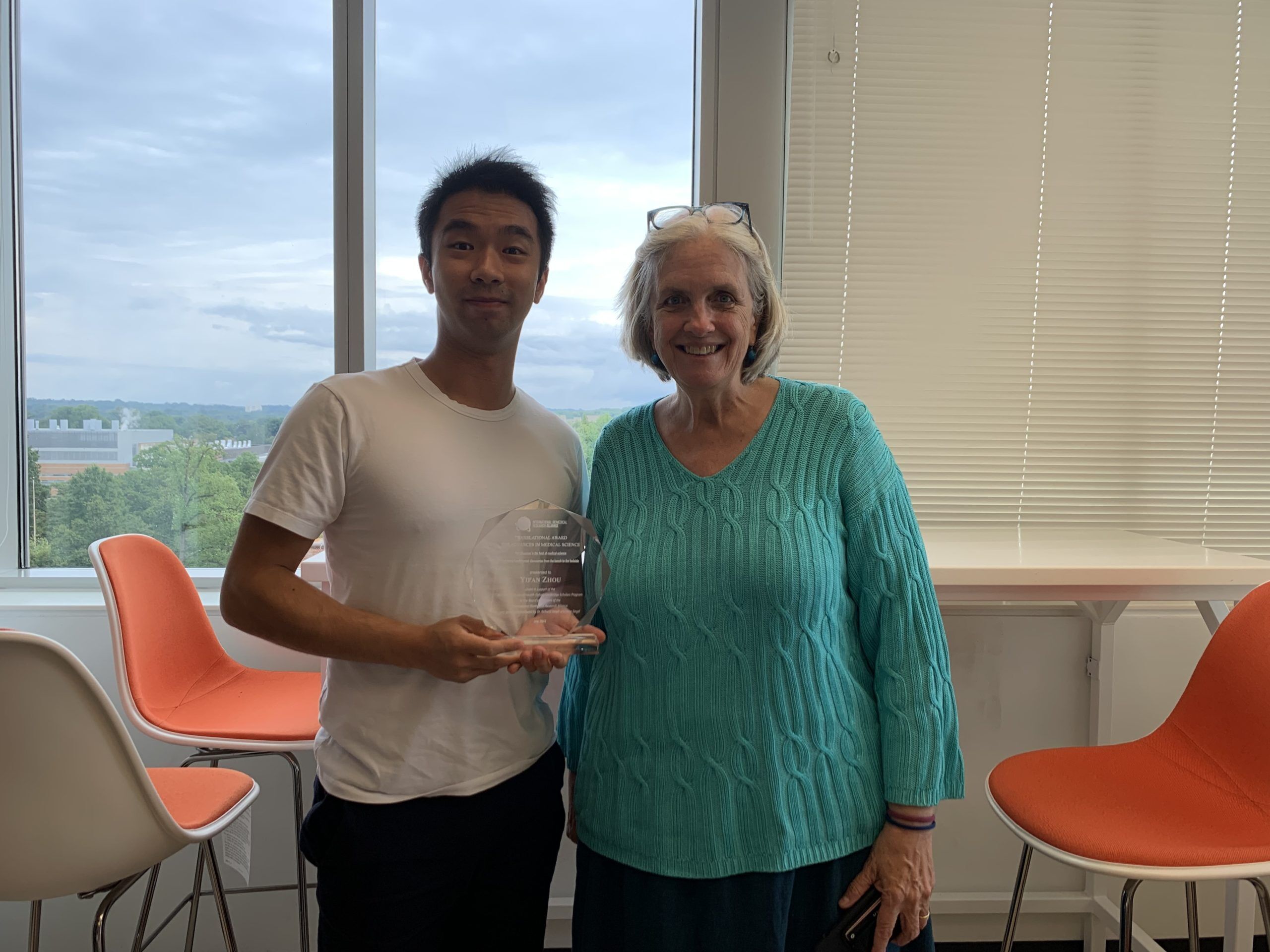First awarded in 2016, the Dr. Richard and Vera Siegel Translational Award was generously endowed by NIH M.D./Ph.D. Partnership Program co-founder, Dr. Richard Siegel, and his wife, Vera. This annual award recognizes advances in the field of medical science that move fundamental discoveries from the bench to the bedside. The recipient of the Translational Award this year was the Class of 2018 NIH-Cambridge Ph.D. Scholar Yifan Zhou who is jointly mentored by Dr. Cindy Dunbar at the National Heart, Lung, and Blood Institute (NHLBI/NIH) and Professor George Vassiliou at the University of Cambridge.
Yifan’s nominator detailed that he masterfully completed his planned project as well as pivoted to new projects when his plans were disrupted by the pandemic. Despite the many challenges that were thrown at him, Yifan completed one of his two initially planned primary projects, demonstrating that macaques are a robust model for human age-related clonal hematopoiesis, now accepted and in press at the premier hematology journal Blood, with Yifan as a co-first author. Since there could be a potential link between age-related hematopoiesis (ARCH) and COVID-19 disease severity, Yifan took on a second project and worked with multiple NIH, UK, and Italian collaborators to collect over 500 sets of samples and clinical annotations to test this hypothesis. He performed the sequencing and analyses and worked with statisticians to come to very firm conclusions, that there is no relationship of COVID-severity to ARCH and this work is under revision also with Yifan as the sole first author.
Finally, Yifan designed and began an additional project at the NIH utilizing his experience to create a disease model for RUNX1 deficiency in macaques to ask whether gene therapies for this disorder would likely be feasible and prevent progression to acute myeloid leukemia. This work generated the first model for human RUNX1 deficiency providing important evidence that gene correction therapies would be unlikely to reverse the premalignant phenotype and is currently being submitted to a high-profile translational journal.
Yifan’s work did not stop at the bench. He taught himself to program and perform sophisticated genomic analyses and has mentored two students in his lab who can attest to his generosity, hard work, cheerful outlook, and vast knowledge. By the time Yifan graduates, he will have at least five first-author publications and we are looking forward to his future work and accomplishments.
“I am very humbled to have been awarded the Dr. Richard and Vera Siegel Translational Award at the 2022 NIH Global Doctoral Partnerships Annual Workshop Awards Ceremony, for my research on the implication of clonal hematopoiesis. I wish to dedicate this award to my mentors, Cindy and George, for their unconditional support and faith throughout my PhD both in and outside the lab, and I have been surrounded by the most talented colleagues who have taught me all the skills. I still recall when I interviewed with Cindy and told her that I had zero background in bioinformatics and hematology but would still love to embark on projects driven by large datasets and hopefully make a direct impact in the patient care setting. I was expecting to be turned down, but instead, she just asked me ‘would you be willing to learn, and I said of course. Since then, it has been a wonderful journey with something new to learn each and every day. I am also very grateful for the support from the International Biomedical Research Alliance the OxCam Program that allowed us to continue our research during the pandemic. I also want to give a special thanks to Dr. Richard and Vera Siegel’s generous support for this Award.”
Yifan will be completing his PhD by early 2023, and following this, he plans to move to Boston and extends his research interest and skills into independent postdoctoral positions.
“Vera and I are delighted that Yifan Zhou has been given this award. His studies of age-related clonal hematopoiesis is a great example of translating findings between human and animal models, and his work on RUNX1 lays important foundations for gene therapy in humans. Hearing first-hand from Yifan about pivoting his PhD work towards analyzing the impact of ARCH on COVID-19 outcomes shows how he and so many other young researchers have been able to take advantage of the unique circumstances of the pandemic, learn new techniques, and make unexpected and important discoveries. I wish all the best for Yifan for what I’m sure will be a great career in translational research,” remarked Dr. Richard Siegel.

